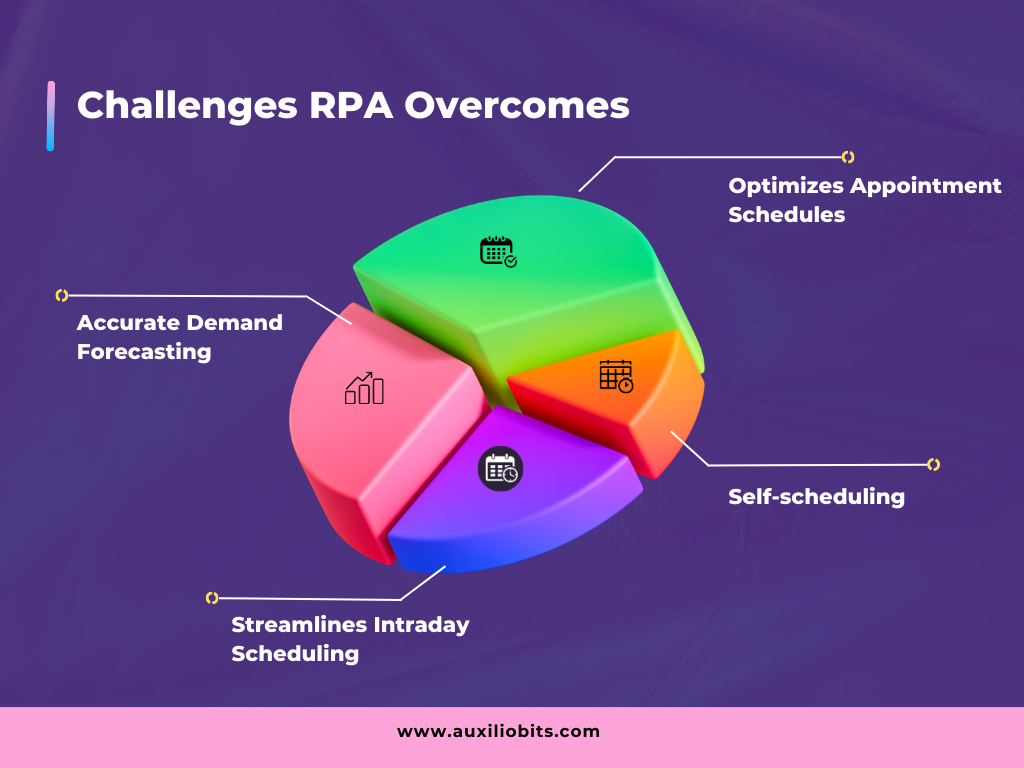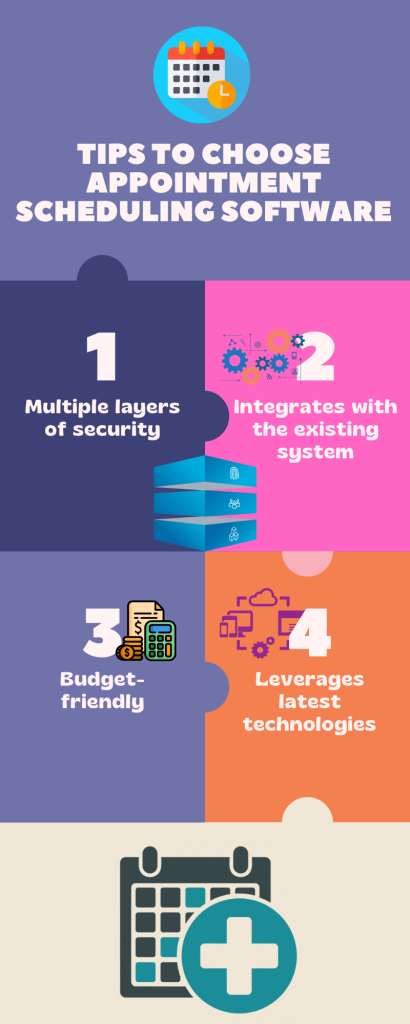
- An efficient appointment scheduling system enhances the patient experience by providing timely and convenient access to healthcare services.
- Different types of appointment scheduling methods help manage scheduled and unscheduled appointments. Besides late arrivals, canceled appointments further complicate the scheduling process.
- AI-powered appointment scheduling software overcomes the shortcomings of manual systems.
- Automation streamlines appointment scheduling by offering features such as demand forecasting, optimization of schedules, self-scheduling,
- It is a good idea to consult automation experts to select the right appointment-scheduling software.
While most of us would like to put the pandemic behind us like a bad dream, it is, unfortunately, resurfacing in many parts of the world again. What this means is that the healthcare sector will need to pull up its socks and get ready to play a vital role in managing the next wave of the pandemic if it takes on the world as we had witnessed earlier.
Healthcare service providers will need to be quick, meticulous, and alert in addressing the demands of the world population. Healthcare service providers on their digital transformation journey who have already automated their workflows will find it relatively easier to cope with the additional pressure that is expected.
Various processes in healthcare services can be automated enhancing their efficacy. One such process is appointment scheduling. Appointment scheduling is a vital aspect of healthcare services where the service providers need to schedule the appointment of patients with caregivers.
An efficient appointment scheduling system provides timely access to healthcare services to patients thereby enhancing the patient experience. Timely access to healthcare services is the cornerstone for good medical outcomes. The purpose of an efficient appointment scheduling system is to ensure convenient and timely access to healthcare for all patients.
Essentially there are three main types of appointments to be scheduled:
1. Primary care visits
In a primary care system, a large number of patients need healthcare services that can be performed within fixed timeframes. Therefore, appointments are split into equal time slots within the timeframe. If an appointment requires more time than the specified time length, multiple appointments are scheduled for the patient. Appointment scheduling in such cases entails matching the available time slots, and service provider’s restrictions, and the day/time preference of the patient and service provider. The challenge is matching so many variables. Besides, each patient has their own perception of urgency of their need, etc. Also, the time taken by the healthcare professional to diagnose and consult may not adhere to the exact time slot.
2. Specialty care visits
Specialty care patients are usually referred to by primary care providers. Usually, such appointments are fixed on behalf of the patients by the medical assistant of the primary healthcare service provider. Appointment scheduling becomes complicated because there is a need to reserve time slots in case a patient needs to visit the specialist immediately after being referred. Besides, the time of the expensive medical specialist needs to be utilized effectively.
3. Elective surgeries
Scheduling surgical appointments is a complex process because of the number of variables involved.
Some of them are:
- Variable procedure times.
- Need for several pre-surgery appointments with different service providers because the patient requires several medical examinations to be conducted prior to the surgery.
- And, more.
Usually, a surgery appointment is scheduled by offering the patient a choice of time slots when the surgery can be performed. The surgeon’s assistant then confirms the exact time slot according to the surgeon’s availability. Surgeons also need to schedule specific procedures to be conducted within the time for which the operating room is available. Most surgeons have preferences regarding specific days and times for performing specific procedures.
Besides these types of appointments, healthcare service providers need to cater to unscheduled encounters such as walk-ins, emergency care patients, etc. The process of appointment scheduling is different for each of these types. Scheduling appointments for any of these types of medical care is very complicated. A manual appointment scheduling system is not only time-consuming but also prone to inaccuracies and errors.
Appointment schedulers face various challenges such as rescheduling canceled procedures, difficulty in forecasting volume and serving demand in case of walk-in patients, etc. Scheduling problems also include no-shows or late arrivals throwing a well-planned schedule haywire.
An inefficient appointment system can be a great source of dissatisfaction for both the patients and the service providers. On one hand, patients are impacted by the lack of availability of timely and convenient slots, and healthcare professionals are affected by the uncertainty in the number of patient appointments on a day-to-day basis.
Hence, it is imperative that healthcare service providers have a systematic system for appointment scheduling that works seamlessly.
This is where automation can play a vital role!
An automated appointment scheduling system streamlines workflows, prevents crowding in waiting rooms, matches supply and demand, and honors patient and service providers’ preferences.
Features of an Automated Appointment Scheduling System:
An AI-powered scheduler facilitates scheduling appointments online using multiple channels such as person-to-person, via phone call, etc.
It reduces no-shows by simplifying cancellations and rescheduling.
Bots optimize the number of appointments in a day by limiting the time slots and time periods available.
Automation software helps keep the patients updated by sending reminders about upcoming appointments and informing the patients in case of any changes in schedule.
Challenges of Appointment Scheduling that Automation Overcomes:
Accurate Demand Forecasting:
Optimizing appointment scheduling can be streamlined by accurate demand forecasting. Automation bots can analyze structured and unstructured data sets and build machine learning models that can comprehend the complex relationship between different data sets.
Optimization of Schedules:
Optimized appointment schedule smooths out demand variations, enhances capacity to serve, besides minimizing the impact of late arrivals or procedures running over schedules. With the help of machine learning and analytics, automation bots optimize patient to staff ratio and enhance assignment capabilities of the existing systems.
Automated Self Scheduling:
Automated self scheduling removes several bottlenecks of the existing appointment scheduling systems. Staff self-scheduling is used alongside centralized shift management. It helps balance individual preferences and staffing needs for the entire unit. Patient self-scheduling enables patients to schedule their appointments through the website or apps, chatbots, etc., without directly interacting with the staff.
Management of Intraday Schedules:
Software bots offer no-show solutions by sending personalized reminders and confirmations. They also provide a digital waitlist for mass notification that helps fill vacant slots upon cancellations. Bots also track and alert patients who have missed or are overdue for routine checkups. AI based intelligent intraday management solutions can recommend changes in schedules to adjust staffing hours, redistributing workload and patients, etc.

Here’s a use case of how an RPA bot streamlines appointment scheduling with RPA:
Some of them are:
- Variable procedure times.
- Need for several pre-surgery appointments with different service providers because the patient requires several medical examinations to be conducted prior to the surgery.
- And, more.
MD TruCare is a cloud based app that streamlines appointment scheduling with the help of RPA. The prime focus of this app is on creating integrative platforms for treatment teams and care professionals. MD TruCare addresses the lacunae in the existing appointment scheduling software such as managing no-shows with RPA.
RPA bots are deployed to facilitating self-service approach to patients. The bots gather all the relevant patient data from the patient trying to book an appointment. Based on the data, the bot schedules appointment with doctors and marks the calendar of the appointment management application. In case of any changes in the schedule from either side, the software updates the other party through email.
Most healthcare service providers have realized the benefits offered by automated appointment scheduling software and data substantiates it.
Here are some interesting statistics about automation in appointment scheduling (Source: https://www.zippia.com/advice/appointment-scheduling-statistics/):
- 58% of healthcare professionals use online scheduling software.
- 68% of patients say that they are more likely to opt for a medical service provider that allows them to book, change, or cancel appointments online.
- 72% of patients and 60% of healthcare professionals say that online appointment booking platforms encourage patients to keep appointments.
Tips to Choose an Appointment Scheduling Software
- Ensure that the software has sufficient layers of security to keep sensitive data safe from cyberattacks.
- Choose an appointment scheduling software that integrates seamlessly with your existing systems.
- Make sure that the appointment scheduling software is within the allocated budget.
- It is recommended that you select an appointment scheduling software that leverages technologies such as AI, Natural Language Processing (NLP), Robotic Process Automation (RPA), and Machine Language (ML). This is because these bots mimic cognitive behavior of the staff and learn from the tasks they perform.

It is a good idea to consult an expert who can guide you in choosing the best appointment scheduling software for your service. The professional team at Auxiliobits is well experienced in the field of providing software solutions in the healthcare sector. We help clients select cost-effective automation solutions that include all the necessary features and integrate easily with existing systems.
In Conclusion
Appointment scheduling software can reduce the stress of over-burdened healthcare professionals. Automation bots help in planning of resource allocation well in advance of patient appointments thereby enhancing the efficiency of the healthcare service providers. Besides, they offer a better control of patient flow and managing different instances in appointment management. An automated appointment scheduling system enhances efficiency and patient satisfaction.
Stay Tuned for more articles on how automation is transforming various sectors!






